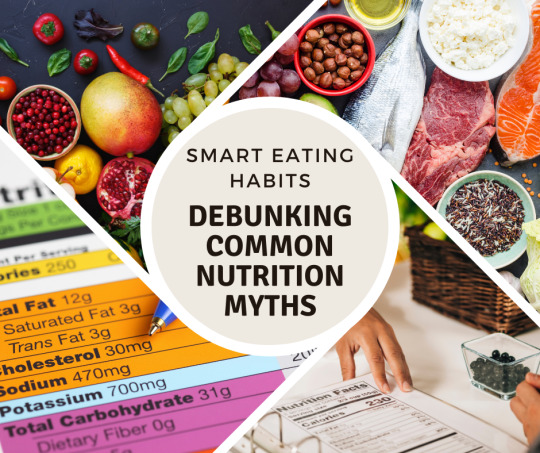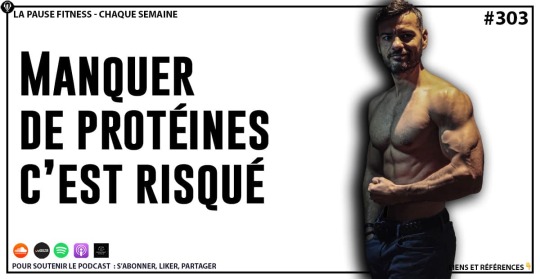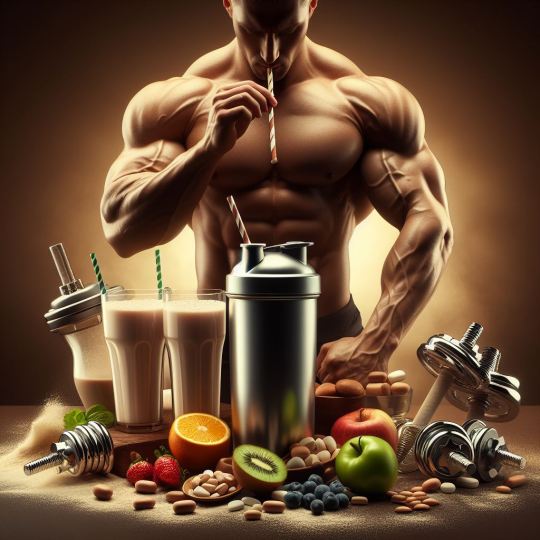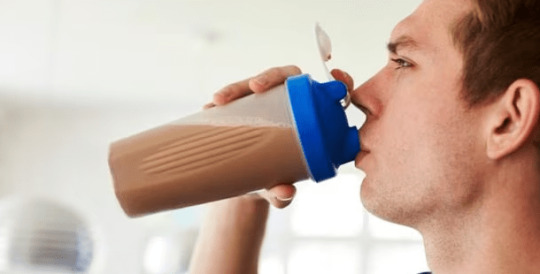#nutrition myths
Text
Vegetable oils are a staple in kitchens around the world, used for cooking, baking, and as ingredients in countless food products. Despite their ubiquity, there are many myths and misconceptions surrounding vegetable oils.
#Vegetable Oils#Cooking Oils#Healthy Fats#Olive Oil#Canola Oil#Coconut Oil#Trans Fats#Saturated Fats#Unsaturated Fats#Omega-3#Omega-6#Smoke Point#Cold-Pressed Oils#Expeller-Pressed Oils#Heart Health#Balanced Diet#Nutrition Myths#Cooking Tips
0 notes
Text
0 notes
Photo

📚 Discover the truth about nutrition myths and elevate your eating habits! 💡🍎 Learn how to distinguish fact from fiction, and unlock the secrets to a healthier lifestyle. #NutritionMythsDebunked #SmartEatingHabits #ScienceBasedNutrition https://www.smarteatinghabits.com/smart-eating-habits-debunking-common-nutrition-myths/
0 notes
Text
Algues contre viande, infections sportives et manque de protéines
NOUVEAU PODCAST 👉 Algues contre viande, infections sportives et manque de protéines
Dans cet épisode, nous allons parler de remplacer la viande par des algues, des infections causées par le sport et du manque de protéines dans la diète moderne.
**NOUVEAU** Les particularités de la musculation à partir de 50 ans
Sommaire :
Des algues pour remplacer la viande
Le sport protège-t-il des infections ?
Aliments transformés et protéines ?
Les particularités de la musculation à…

View On WordPress
#besoins en protéines#fitness podcast#la vérité sur les protéines#nutrition#nutrition coaching#nutrition myths#nutrition program#nutrition sportive#podcast#pre-workout nutrition#protein#protéine#proteine en poudre#protéine musculation#protéines#protéines en poudre#protéines musculation#protéines végétales#sports nutrition
0 notes
Text
The amount of misinformation surrounding nutrition is absolutely absurd. If you ask the average person who thinks they know a lot about nutrition, they'll likely have less than 0 understanding of how it works. If you ever have a question about nutrition or exercise, I genuinely cannot recommend Renaissance Periodization enough. The only way information gets put out is if a consideration of ALL the scientific literature is considered, and I have literally never seen them put out any bad info. I've seen Dr. Mike recommend people not buy his powerlifting training templates because he thought juggernaut.ai was better. I have never seen a more honest source of information coming out of the industry. Even people who are similarly respected end up plugging bullshit supplements or, at the very least, will NOT tell you if a competitor is a better source of information. If you ever, for any reason, find yourself thinking you know something about nutrition and that understanding guides how you eat or train, PLEASE look up an RP video on the topic. (they are also an extremely good source of info for bodybuilding and strength building (and yes, bodybuilders are very strong, and anyone who tells you they're show muscles and not practical muscles are 99/100 times weaker than even amateur bodybuilders))
#made this poast bc i have legit never seen a single post outside of very niche fitness circles on nutrition that has not contained a myth#certainly not on tumblr#that has been disproven already#saw like 5 today lol#also im sorry if this seems like I'm vauging a specific person I prommy I'm not I just saw an rp video on a topic that a lot of people have#wild misunderstandings about#(sugar)
160 notes
·
View notes
Text
I had to relearn what I knew about protein, and through what I learned, I realized we don't actually need that much protein. There's this overemphasis on protein, particularly animal protein. And what I've learned now, at the end of the day, it's not how much protein you're consuming, but how much you're actually assimilating. Because when you're under this kind of protein spell, which was where I was, I forgot about everything else. I forgot about, you know, what about my antioxidants, what about my fiber? I just did not think of that.
- Luke Tan in Let Us Be Heroes - The True Cost of Our Food Choices (2018)
#q#quotes#let us be heroes#the true cost of our food choices#true nourishment#protein myths#protein supplement#fitblr#wfpb#whole food plant based#nutrition#food centric herbalism#food industry#leveling up#holistic leveling up#rda#recommended daily allowance#food science#standard american diet#that girl#green juice girl#sidewalkchemistry
3 notes
·
View notes
Text
my dad thinks hes a health expert because he watches videos of doctors saying questionable shit on youtube. "cracking your joints too much means youre going to get arthritis" "intermittent fasting is good for you" "sugar is bad, salt is good, simple as that" and he says these things with such confidence as if he didnt just learn them 3 minutes ago from a highly unreliable source that he 100% did NOT fact-check
#the things he says about food and nutrition are especially insulting. he hardly ever cooks and when he does it's usually just meat+starch#if it's dad's turn to cook u know someone's gotta intervene and make sure there are vegetables other than pickles on the table#meanwhile my mother has been working her ass off to feed nutritious meals to her family for 26+ years#AND she grew up as a fat girl so she is well acquainted with fad diets & health food myths#dad does not have the CREDENTIALS
4 notes
·
View notes
Text
Top 8 Nutrition Myths That Just Won't Die
Nourishment MYTHS THAT MAKE FITNESS LESS SATISFYING
A British report observed that the normal timeframe of realistic usability of another side interest was 16 months.
Whether your recently discovered enthusiasm includes standard redirections like photography or bicycling, or less popular pursuits like serious professional canine care or Hikaru dorodango (a Japanese work of art that includes cleaning soil into smooth little balls), a great many people surrender it following a little while. Read more
2 notes
·
View notes
Quote
The myth of the vegetarian nation has influenced policy matters such as serving eggs in the mid-day meal scheme for children attending government and government-aided schools. Barely a third of the states provide eggs to children under the scheme despite the Hyderabad-based National Institute of Nutrition — it works under the aegis of the Indian Council of Medical Research — certifying that eggs are loaded with more nutrients and easier to procure compared to alternatives such as milk and bananas.
‘NFHS data on diet practices should lead to more informed debate on nutrition, remove blinkers of policymakers’, Indian Express
#Indian Express#NFHS-5#India#myth#mid-day meal scheme#government schools#government-aided schools#National Institute of Nutrition#Indian Council of Medical Research#eggs#nutrients#procurement#policy matters
3 notes
·
View notes
Text
Are Protein Shakes Only for People Who Are Underweight?

Dispelling the Myth: Protein Shakes Aren't Just for the Underweight
Protein shakes have long been associated with weight gain or muscle building, leading many to believe they are exclusively for those who are underweight or trying to bulk up. However, the reality is far more nuanced. These nutritional supplements offer a wide array of benefits beyond weight management, catering to various lifestyles and fitness goals.
Understanding the Purpose of Protein Shakes
Before delving into the multifaceted role of protein shakes, it's crucial to grasp their fundamental purpose. At its core, protein supplementation aims to support muscle repair, growth, and overall health. Whether you're an athlete striving for peak performance or an individual seeking to maintain a balanced diet, protein shakes can play a pivotal role in achieving your objectives.
What Are Protein Shakes?
Definition and Composition of Protein Shakes
Protein shakes consist of concentrated sources of protein, typically derived from whey, casein, soy, or other plant-based sources. These supplements often contain additional ingredients such as vitamins, minerals, and flavorings to enhance taste and nutritional value. By providing a convenient and efficient way to increase protein intake, protein shakes serve as a convenient option for individuals with busy lifestyles or specific dietary requirements.
Various Types of Protein Shakes: Whey, Casein, Soy, etc.
The diversity of protein shake formulations allows consumers to select products tailored to their preferences and dietary needs.
Whey protein, prized for its rapid absorption and high concentration of essential amino acids, is favored by many athletes for post-workout recovery.
Casein, on the other hand, offers a slower release of amino acids, making it an ideal option for prolonged satiety and overnight muscle maintenance.
Additionally, soy protein provides a plant-based alternative suitable for vegetarians and vegans, offering comparable benefits to animal-derived proteins.
Protein Shakes in the Context of Fitness and Nutrition
In the realm of fitness and nutrition, protein shakes serve as a convenient and effective tool for optimizing performance and recovery. Whether you're aiming to build muscle, lose weight, or simply maintain a healthy lifestyle, incorporating protein shakes into your daily regimen can help bridge nutritional gaps and support your overarching goals.
Protein Shakes for Weight Management
Protein Shakes and Weight Loss: How They Work
Contrary to popular belief, protein shakes can be integral to weight loss strategies, thanks to their ability to promote satiety and preserve lean muscle mass. By replacing higher-calorie meals with protein shakes, individuals can create a caloric deficit conducive to fat loss while ensuring adequate protein intake to support metabolic function and muscle integrity.
Incorporating Protein Shakes into a Balanced Diet
While protein shakes can be a valuable tool for weight management, they should complement—not replace—whole food sources of nutrients. A balanced diet comprising lean proteins, fruits, vegetables, whole grains, and healthy fats remains essential for long-term health and sustained weight loss. Protein shakes should be integrated into a comprehensive meal plan that prioritizes nutrient density and variety.
Role of Protein in Metabolism and Satiety
Protein plays a critical role in regulating metabolism and appetite, making it a cornerstone of effective weight management strategies. By increasing protein consumption, individuals can enhance feelings of fullness, reduce cravings, and support metabolic rate, thereby facilitating sustainable weight loss outcomes. Protein shakes offer a convenient means of boosting daily protein intake without excessive caloric intake, making them a valuable asset in the pursuit of a healthier weight.
Protein Shakes for Muscle Building
Protein's Role in Muscle Repair and Growth
Muscle building, or hypertrophy, relies heavily on adequate protein intake to fuel the repair and synthesis of muscle tissue following exercise-induced damage. Protein shakes, particularly those rich in essential amino acids like leucine, serve as an efficient source of nutrients for stimulating muscle protein synthesis and accelerating recovery. Consuming protein shakes in conjunction with resistance training can amplify muscle hypertrophy and enhance strength gains over time.
Timing: When to Consume Protein Shakes for Optimal Muscle Building
The timing of protein consumption is a crucial consideration for maximizing muscle protein synthesis and recovery. Consuming a protein shake within the post-exercise "anabolic window," typically within 30 minutes to two hours after training, can expedite muscle repair and replenish glycogen stores. Additionally, incorporating protein-rich snacks or meals throughout the day ensures a steady supply of amino acids to support ongoing muscle maintenance and growth.
Importance of Protein Quality in Muscle Development
Not all proteins are created equal when it comes to supporting muscle development. High-quality protein sources, such as whey and casein, boast superior digestibility and amino acid profiles, making them optimal choices for muscle-building purposes. By prioritizing protein quality and quantity, individuals can optimize the efficacy of their protein supplementation regimen and unlock their full potential for muscle growth and repair.
Protein Shakes for Athletic Performance
Fueling Workouts with Protein Shakes
Athletes and fitness enthusiasts alike rely on protein shakes to fuel their workouts and enhance performance. Consuming a protein shake before or during exercise provides a readily available source of amino acids to sustain energy levels, delay fatigue, and promote endurance. Additionally, incorporating carbohydrates into protein shakes can further optimize performance by replenishing glycogen stores and supporting prolonged exertion.
Enhancing Endurance and Recovery with Protein Supplementation
Intense physical activity places considerable strain on the body, necessitating adequate nutritional support for optimal recovery and adaptation. Protein shakes, with their rapid absorption and bioavailability, offer an efficient means of replenishing depleted muscle glycogen and initiating the repair process post-exercise. By prioritizing post-workout protein consumption, athletes can expedite recovery, minimize muscle soreness, and prepare for subsequent training sessions more effectively.
Case Studies: Athletes Who Benefit from Protein Shakes
Numerous studies have underscored the performance-enhancing effects of protein supplementation in athletes across various disciplines. From endurance athletes seeking to prolong time to exhaustion to strength athletes aiming to maximize muscle hypertrophy, protein shakes have emerged as a staple in their nutritional regimens. Real-world examples abound, with elite athletes incorporating protein shakes into their training routines to gain a competitive edge and achieve peak performance.
Protein Shakes for Health and Wellness
Meeting Daily Protein Requirements
Protein serves as a foundational nutrient essential for maintaining overall health and well-being. Meeting daily protein requirements is paramount for supporting immune function, preserving lean muscle mass, and facilitating essential physiological processes. While whole food sources remain the primary means of meeting these needs, protein shakes offer a convenient and practical solution for individuals with busy lifestyles or specific dietary preferences.
Managing Blood Sugar Levels with Protein Shakes
The impact of dietary choices on blood sugar regulation cannot be overstated, particularly in the context of metabolic health and weight management. Protein shakes, with their minimal impact on blood glucose levels compared to high-carbohydrate alternatives, offer a viable option for individuals seeking to stabilize energy levels and mitigate postprandial spikes. By incorporating protein-rich snacks or meal replacements into their diets, individuals can exert greater control over their blood sugar and insulin responses, reducing the risk of metabolic dysfunction and promoting long-term health.
Protein Shakes for Aging Adults: Maintaining Muscle Mass and Bone Density
As individuals age, preserving muscle mass and bone density becomes increasingly critical for maintaining mobility, independence, and overall quality of life. Protein shakes can play a pivotal role in addressing age-related muscle loss, or sarcopenia, by supplying essential amino acids necessary for muscle protein synthesis and repair. Additionally, protein supplementation has been shown to support bone health by enhancing calcium absorption and reducing the risk of osteoporosis in older adults.
Protein Shakes for Vegetarians and Vegans
Plant-Based Protein Options in Protein Shakes
For individuals following vegetarian or vegan diets, obtaining adequate protein can pose a unique challenge due to the absence of animal-derived sources. Fortunately, the market offers an array of plant-based protein shakes made from ingredients such as pea, hemp, rice, and quinoa. These plant-based alternatives provide complete protein profiles comparable to animal sources, making them suitable choices for individuals seeking to meet their protein needs while adhering to plant-centric lifestyles.
Ensuring Adequate Protein Intake on a Plant-Based Diet
Despite the prevalence of plant-based protein options, vegetarians and vegans must be vigilant in ensuring they meet their daily protein requirements. Incorporating a variety of protein-rich plant foods into meals and snacks, alongside plant-based protein shakes, can help individuals achieve optimal protein intake and support muscle maintenance and growth. Additionally, combining complementary plant proteins—such as legumes and grains—can enhance the overall quality of protein consumed and ensure sufficient intake of essential amino acids.
Benefits of Plant-Based Protein Shakes Beyond Weight Management
Plant-based protein shakes offer benefits beyond weight management, extending to cardiovascular health, environmental sustainability, and ethical considerations. Research suggests that plant-based diets rich in legumes, nuts, seeds, and whole grains may reduce the risk of chronic diseases such as heart disease, diabetes, and certain cancers. Furthermore, opting for plant-based protein sources contributes to lower greenhouse gas emissions and conserves natural resources compared to animal agriculture, aligning with principles of environmental stewardship and compassion for animals.
Choosing the Right Protein Shake
Considerations: Taste, Ingredients, and Allergies
When selecting a protein shake, several factors warrant consideration, including taste preferences, ingredient quality, and allergen sensitivities. Individuals should opt for protein shakes with minimal added sugars, artificial flavors, and preservatives to maximize nutritional value and minimize potential adverse effects. Additionally, those with allergies or dietary restrictions should scrutinize labels carefully and opt for allergen-free or plant-based options to avoid unintended reactions.
Reading Labels: What to Look for in a Quality Protein Shake
Navigating the myriad of protein shake products can be overwhelming, but reading labels can help discern between high-quality options and inferior alternatives. Look for protein shakes with a high protein content per serving, ideally derived from whole food sources rather than isolated proteins. Additionally, prioritize products with minimal additives and fillers, opting for organic or non-GMO certifications when available to ensure product integrity and purity.
Personalizing Protein Shake Choices Based on Individual Needs
No single protein shake suits everyone's needs, so it's essential to personalize choices based on individual preferences, goals, and dietary considerations. Experimenting with different flavors, formulations, and brands can help individuals find the perfect fit for their taste buds and nutritional requirements. Whether you're seeking a post-workout recovery shake, a meal replacement option, or a convenient snack on the go, there's a protein shake out there to suit your needs and preferences.
Incorporating Protein Shakes into Your Routine
Creative Protein Shake Recipes for Any Occasion
One of the greatest advantages of protein shakes is their versatility, allowing for endless customization and creativity in the kitchen. From classic combinations like chocolate banana to adventurous blends featuring superfoods like spirulina and chia seeds, the possibilities are endless. Experimenting with different ingredients, textures, and flavor profiles can transform protein shakes from mere supplements into culinary delights to be enjoyed at any time of day.
Meal Replacement vs. Supplement: Finding the Right Balance
While protein shakes can serve as convenient meal replacements in a pinch, they should not replace whole food meals entirely. Instead, view protein shakes as supplements to complement a balanced diet, providing additional protein and nutrients when needed. Reserve meal replacement shakes for situations where whole food options are impractical or unavailable, such as busy mornings or post-workout recovery periods, while prioritizing whole foods for optimal nutrition and satiety.
Tips for Incorporating Protein Shakes into Your Daily Routine
Incorporating protein shakes into your daily routine is easier than you might think, thanks to their convenience and versatility. Start by identifying opportune moments throughout the day to enjoy a protein shake, such as post-workout, as a mid-morning snack, or as a dessert alternative. Invest in a quality blender to whip up delicious protein shake recipes with ease, and consider prepping ingredients in advance to streamline the process and ensure consistency in your routine.
Safety and Risks of Protein Shakes
Potential Side Effects of Excessive Protein Intake
While protein shakes offer numerous benefits, excessive consumption can pose risks to health, particularly in susceptible individuals. Consuming protein in excess of daily requirements may strain the kidneys, leading to dehydration, electrolyte imbalances, and impaired kidney function over time. Additionally, high-protein diets may exacerbate existing renal conditions or predispose individuals to kidney stones, necessitating moderation and careful monitoring of protein intake.
Ensuring Proper Hydration with Protein Supplementation
One potential pitfall of protein supplementation is its potential to exacerbate dehydration, particularly when consumed in concentrated forms like protein powders or shakes. To mitigate this risk, individuals should prioritize adequate hydration alongside protein supplementation, ensuring a balance of fluids to support optimal kidney function and metabolic processes. Aim to drink plenty of water throughout the day, especially before and after consuming protein shakes, to maintain hydration and prevent potential complications.
Consulting with a Healthcare Professional Before Starting a Protein Shake Regimen
Before embarking on a protein shake regimen, it's prudent to consult with a healthcare professional, particularly if you have pre-existing health conditions or concerns. A registered dietitian or nutritionist can provide personalized recommendations based on your unique needs and goals, helping you navigate the vast array of protein shake products and formulations available on the market. Additionally, individuals with allergies, intolerances, or dietary restrictions should seek guidance to ensure safe and suitable protein options are selected.
Myths and Misconceptions About Protein Shakes
Addressing Common Concerns: Do Protein Shakes Make You Bulky?
One prevailing myth surrounding protein shakes is the notion that they contribute to excessive muscle bulk or "bulking up," particularly among women. In reality, achieving a bulky physique requires a combination of factors, including genetics, training intensity, and overall calorie intake—not solely protein consumption. Protein shakes, when consumed in moderation as part of a balanced diet and exercise routine, can support lean muscle development and aid in achieving a toned, athletic physique without excessive bulk.
Debunking the Idea That Protein Shakes Are Only for Bodybuilders
Another misconception is that protein shakes are exclusively for bodybuilders or elite athletes, overlooking their broader applicability to individuals of all ages, fitness levels, and lifestyles. Whether you're a busy professional seeking convenient nutrition on the go, an active senior looking to maintain muscle mass and bone density, or a fitness enthusiast striving for optimal performance, protein shakes can offer valuable support in achieving your health and wellness goals. By dispelling this narrow stereotype, we can empower individuals to explore the diverse benefits of protein supplementation and make informed choices about their nutritional strategies.
Clarifying the Role of Protein Shakes in a Healthy Lifestyle
Ultimately, protein shakes are just one component of a holistic approach to health and wellness, complementing whole food sources of nutrients, regular exercise, adequate hydration, and sufficient rest and recovery. While protein shakes can be a convenient and effective tool for meeting daily protein requirements and supporting various fitness goals, they should be integrated into a comprehensive lifestyle regimen that prioritizes balance, moderation, and sustainability. By demystifying misconceptions and promoting a nuanced understanding of protein supplementation, we can empower individuals to optimize their health, performance, and overall well-being.
Conclusion
The Versatility of Protein Shakes: Not Just for the Underweight
In conclusion, protein shakes offer far-reaching benefits beyond their association with weight gain or muscle building. From supporting weight management and muscle development to enhancing athletic performance and promoting overall health, protein shakes cater to diverse needs and objectives across the spectrum of fitness and wellness. By embracing the versatility of protein shakes and incorporating them into a balanced lifestyle regimen, individuals can unlock their full potential for health, vitality, and longevity.
Empowering Individuals to Make Informed Choices About Protein Supplementation
As we dispel myths and misconceptions surrounding protein shakes, we empower individuals to make informed choices about their nutritional strategies and embrace the myriad benefits of protein supplementation. Whether you're seeking to optimize athletic performance, achieve weight management goals, or simply support overall health and well-being, protein shakes offer a convenient and effective solution to help you reach your objectives. By harnessing the power of protein shakes in conjunction with a holistic approach to nutrition and fitness, you can embark on a journey toward a healthier, happier, and more vibrant life.
0 notes
Text
Debunking Myths About a Mother's Postpartum Diet: Evidence-Based Insights
Explore evidence-based insights to debunk common myths surrounding a mother's diet after childbirth. From spicy foods to alcohol consumption, learn how to make informed choices for both maternal health and breastfeeding success.
Today we will explore evidence-based insights to debunk common myths surrounding a mother’s diet after childbirth. Mother and her family members are always concerned about what to include in postpartum diet and what to exclude. This can lead to a very restricted and monotonous, bland diet and reduce the interest of mother in eating simultaneously causing nutritional deficiencies. From spicy foods…

View On WordPress
#baby#baby&039;s diet#breastfeeding#dietary myths#evidence-based nutrition#health#lactation#maternal diet after childbirth#maternal health#myth debunking#newborn nutrition#nutrition#parenting#postnatal nutrition#postpartum#postpartum diet#pregnancy
0 notes
Photo





(via Demystifying Nutrition(Thriving) - A Guide for Everyone)
0 notes
Text
Debunking Myths: The Truth About Keto Diets and Weight Loss
Welcome to our comprehensive guide on keto diets and weight loss! In this blog post, we’ll delve deep into the world of ketogenic diets, separating fact from fiction and debunking common myths surrounding this popular weight loss approach. Whether you’re considering starting a keto diet or simply curious about its effectiveness, this guide will provide you with the knowledge you need to make…

View On WordPress
0 notes
Text
How Much Protein do you ACTUALLY need for Bodybuilding?
Figuring out how much protein you need is tough. For folks that body build, it can be even tougher. Your weight, gender, protein quality and content (be it animal vs plant), workouts etc all have factors that need to be considered. Seriously, how much protein do you ACTUALLY need for bodybuilding?
Fueling your body for maximum muscle growth is a complex game, and protein often takes center…

View On WordPress
#bodybuilding#bodybuilding myths#exercise#fitness#gym#health#myths#natural bodybuilding#nutrition#one gram per pound#protein#protein for bodybuilding#protein myths#texas#texas bodybuilding#training#workout#workout myths
1 note
·
View note
Text
Mastering Bariatric Surgery Insider Tips and Surgical Strategies Book By Dr Atef Ahmed #BariatricSu
#medicine #bariatric
#bariatric #master #tips #suregry
#bariatricsurgery
#weightlosssurgery
#gastricsleeve
#gastricbypass
#bariatricjourney
#weightlossgoals
#healthylifestyle
#newbeginnings
Mastering Bariatric Surgery Insider Tips and Surgical Strategies Book By Dr Atef Ahmed #BariatricSuccess #WeightLossJourney
Get your Copy Now
Other Books Of The Author
“Navigating the Bariatric Journey: A…

View On WordPress
#Bariatric surgery#body image#challenges#diabetes prevention#emotional well-being#exercise routines#expert advice#fitness#health transformation#hormonal changes#lifestyle changes#meal prep#mental wellness#metabolic health#metabolism#mindset#motivation#myths debunked#myths vs facts#nutrition#post-op#pre-op preparation#Q&A#real-life transformations#recipes#recovery#science#success stories#support system#surgery benefits
0 notes